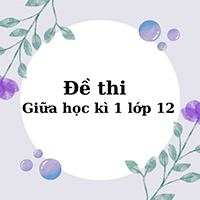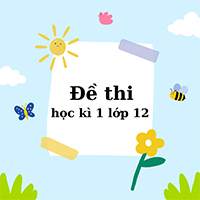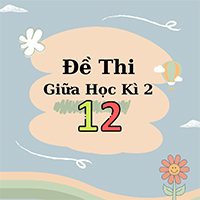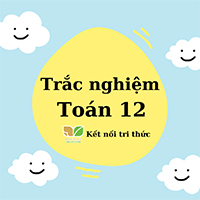Giải bài tập SGK Tiếng Anh lớp 12 Chương trình mới: Review 3 (Unit 6 - 7 - 8)
Giải bài tập SGK Tiếng Anh lớp 12 Chương trình mới: Review 3
VnDoc.com xin giới thiệu đến các bạn Giải bài tập SGK Tiếng Anh lớp 12 Chương trình mới: Review 3 (Unit 6 - 7 - 8) do VnDoc.com sưu tầm và đăng tải dưới đây là nguồn tài liệu cần thiết cho bất kì bạn nào muốn có bài học thành công. Bên cạnh đó là nguồn kiến thức hay giúp các bạn tổng hợp dễ dàng, chuẩn bị cho những kì thi quan trọng.
Giải bài tập SGK Tiếng Anh lớp 12 Chương trình mới Unit 9: Choosing a career
Giải bài tập SGK Tiếng Anh lớp 12 Chương trình mới Unit 10: Lifelong learning
Giải bài tập SGK Tiếng Anh lớp 12 Chương trình mới: Review 2 (Unit 4 - 5)
Giải bài tập SGK Tiếng Anh lớp 12 Chương trình mới: Review 1 (Unit 1 - 2 - 3)
Language (Ngôn ngữ) - trang 42 Review 3 (Units 6 - 7 - 8) SGK tiếng Anh 12 mới
Tổng hợp các bài tập trong phần Language (Ngôn ngữ) - trang 42 Review 3 (Units 6 - 7 - 8) SGK tiếng Anh 12 mới
Vocabulary
1. Use the correct form of the words in the box to complete the sentences. A word may be used more than once.
Sử dụng các hình thức đúng của các từ trong hộp để hoàn thành câu. Một từ có thể được sử dụng nhiều hơn một lần.
Gợi ý đáp án:
1. qualities 2. android/ robot 3. extinct
4. robots 5. Android 6. probation
2. Complete the following table. Then use the words in the table to complete the sentences.
Hoàn thành bảng sau. Sau đó sử dụng các từ trong bảng để hoàn thành các câu.
|
Noun |
|||
|
Adj. |
evolutionary |
conserved |
|
|
Verb |
diversify |
Gợi ý đáp án:
|
Noun |
evolution |
conservation |
diversity |
|
Adj. |
evolutionary |
conserved |
diverse |
|
Verb |
evolve |
conserve |
diversify |
1. conservation
2. evolution
3. diversity
4. conserve
5. evolve
6. diverse
Pronunciation
3. Listen to part of the conversation below and mark the stressed syllables in the sentences. Then listen to the conversation again and practise it with a partner, using appropriate sentence stress.
Nghe một phần của cuộc trò chuyện dưới đây và đánh dấu những âm tiết được nhấn mạnh trong các câu. Sau đó, lắng nghe cuộc trò chuyện một lần nữa và luyện tập nó với một người bạn, sử dụng nhấn mạnh câu thích hợp.
Student: What should I do to make a gooc impression on the job interviewer?
Career adviser: I think the most important thing is tc demonstrate your strong communication skills.
Student: My strong communication skills? I'm not sure whether I have any. What exactly do you think I need to do?
Career adviser: Well, do things like listening attentively, speaking confidently, making eye contact, and asking questions when appropriate.
4. Work with a partner. Practise asking questions and giving answers, using the future perfect and the prompts below.
Làm việc cùng một người bạn. Thực hành đặt câu hỏi và đưa ra câu trả lời, bằng cách sử dụng thì tương lai hoàn thành và các hướng dẫn dưới đây.
Gợi ý đáp án:
1. How many pages will you have written by tomorrow? I'll have written 5 pages by then.
2. How many trees will our class have planted by the end of the day? We'll have planted 100 by then.
3. How many robots will the A.I. company have invented by the end of the year? They'll have invented 8 by then.
4. How long will this rhino have lived in the rescue centre by the end of this year? It'll have lived there for 5 years by then.
5. How many applications will the company have received by January 3rd? They'll have received 200 by then.
6. How many animals will the rescue centre have saved and taken in by this time next year? They'll have saved and taken in hundreds (of them) by then.
5. Complete the sentences, using the correct form of the verbs in the box.
Hoàn thành các câu, sử dụng hình thức đúng của động từ trong hộp.
Đáp án:
1. serviced
2. repair
3. published
4. pulled out
5. to design
6. stolen
6. Complete the sentences, reporting what was said. (Hoàn thành các câu, tường thuật lại những điều đã được nói đến.)
Gợi ý:
1. My mother told me to spend more time studying and less time playing games.
2. The students asked the scientist to tell them about the importance of species diversity for all forms of life.
3. The environmentalist told the business community not to harm the environment or disturb the balance of the ecosystem.
4. The teacher asked the students to show him/her their reports on wildlife.
5. My brother offered to help me with my research into the latest generation of androids.
6. The A.I. expert advised the students to learn howto use the new smartphones apps.
7. Turn the following sentences into reported speech, using the reporting verbs: warn, suggest, promise, explain, advise, remind. (Chuyển câu trực tiếp thành câu gián tiếp, sử dụng động từ tường thuật.)
Example:
"Our visit to the animal rescue centre will be postponed to next week" said the teacher.
—> The teacher explained that our/their visit to the animal rescue centre would be postponed to the following week.
1. "Don't forget to drop into the robot shop on the way home." said Minh to Quang.
2. "I think you should write a report on the saola." said my mother.
3. "Don't pull the cat's tail or it will scratch you." the old lady said to him.
4. "I'll work harder to get good qualifications." said Huong.
5. "How about activating the next generation robot?" said the team leader.
Gợi ý đáp án:
1. Minh reminded Quang to drop into the robot shop on the way home.
2. My mother advised me to write a report on the saola.
3. The old lady warned him not to pull the cat's tail or it would scratch him.
4. Huong promised to work harder to get good qualifications.
5. The team leader suggested activating the next generation robot.
Skills (Kỹ năng) - trang 44 Review 3 (Units 6 - 7 - 8) SGK tiếng Anh 12 mới
Tổng hợp các bài tập trong phần Skills (Kỹ năng) - trang 44 Review 3 (Units 6 - 7 - 8) SGK tiếng Anh 12 mới
SKILLS
READING
IUCN Red List
1. Read the text about IUCN Red List. (Đọc văn bản về Danh sách Đỏ IUCN)
The International Union for Conservation of Nature (IUCN) Red List is a comprehensive catalogue of the conservation status of species. Information is collected from all over the world and carefully analysed. Many factors are taken into consideration, such as the remaining numbers, the overall increase or decrease in the population, breeding success rates, and known threats. The IUCN Red List then classifies species into seven categories: Extinct (EX), Extinct in the wild (EW), Critically Endangered (CR), Endangered (EN), Vulnerable (VU), Near-threatened (NT), or Least Concern (LC).
After Extinct and Extinct in the wild, the highest risk category assigned by the IUCN Red List is Critically Endangered. A Critically Endangered species is a species that is facing a very high risk of extinction in the wild. Endangered is the next most severe conservation status for wildlife. A Vulnerable species is one that is likely to become endangered if the circumstances threatening its survival and reproduction do not improve. The main reason for its vulnerability is habitat loss or destruction.The species labelled Near Threatened and Least Concern, have had their conservation status assessed and found to be relatively safe and healthy, though they may be in decline.
The number of extinct and endangered species is increasing every year. It is estimated that over 40 per cent of the species on Earth are at risk of extinction. The IUCN Red List featured 3079 animal and 2655 plant species as endangered worldwide in 2012, and 1102 and 1197 respectively in 1998. Many countries in the world now have laws to conserve wild species and protect endangered and threatened species. However, much more has to be done to successfully safeguard the biodiversity of our planet.









